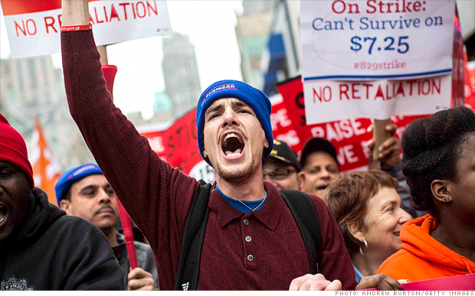Why minimum wage deserves maximum attention
December 19, 2014

Most students have jobs or are seeking employment, and all of them agree that they deserve fair pay for the work they do. However, in many states across the country, fair pay is an unattainable luxury for those who need it most. On a federal, state and local level, the minimum wage requires a serious boost to help struggling families stay afloat.
The city of Chicago has taken steps to redress this wrong. The current minimum wage being just $8.25 per hour, Chicago has decided to pass a city ordinance that will hike the minimum wage up to $10 by July 1, 2015, and $13 by 2019, a 58 percent increase over five years. This will be a massive improvement for low-income households, who, according to MIT’s Living Wage Calculator, need a wage of $20.35 per hour一working full time一to provide a basic standard of living for a family of four. By helping to close this gap between the minimum wage and the living wage, Chicago has taken a large stride forward in improving the lives of its nearly three million inhabitants.
The assistance provided by this bill, though, is largely insignificant compared to the effect that legislation on a statewide or federal level could supply. The current Illinois minimum wage is $8.25, the same as Chicago’s, but the Illinois House of Representatives has faced serious adversity in trying to get the wage increased. HB 3718, the bill in question, was sent back to the Rules Committee in Oct. 2013, and the proposal has struggled to garner any sort of bipartisan support and has not yet even come up for a vote. Republican opponents to these suggested minimum wage increases argue that such measures would push businesses out of the state and lessen job opportunities. With the recent election of Republican Governor Bruce Rauner, any hopes for this bill’s passage have taken a serious hit.
What many critics of the current draft don’t acknowledge, however, is that higher wages for the lower-middle class contribute to higher spending, benefiting businesses and ultimately creating more jobs as these businesses expand. This idea of trickle-up economics has been put into play in Seattle, where a city ordinance will move the minimum wage up to $15 per hour within three years. Some businesses are already beginning to implement this new law, showing that even some large corporations are backing the wage hike. With a disproportionate percentage of low-income workers being black, Hispanic or women, this measure also promotes social equality and diversity in the workplace.
President Obama has long been an ardent supporter of raising the federal minimum wage to $10.10 per hour in order to ensure just pay for all people across the United States. Unfortunately, he has made little headway in Congress on the matter, with House Republicans led by Speaker John Boehner vehemently refusing to bring Obama’s bill to a vote or even negotiate the titles within. With the Senate swinging in favor of the GOP after the midterm elections, it seems that no comprehensive bill on the subject will be passed anytime soon.
Abhorred by Republicans in Congress and failing to attract any serious support in the Illinois state legislature, the chances for minimum wage reform seem highly unlikely. However, to give up on such an important issue is simply not an option. As a community, as a people and as a country, we must continue to fight for change and equality for all.







Stone Cai • Dec 19, 2014 at 10:50 pm
Macro economic lesson courtesy of AP Macro.
http://www.swcollege.com/bef/policy_debates/increase_minimum.html
At artificially high minimum wage, (as set by minimum wage), demand by firms for workers is significantly less than the supply of workers available. Although, minimum wage is not indexed for inflation, it is absurd to believe arbitrarily raising the minimum wage will be some great equalizer. More unemployment or increasing the minimum wage to help people that are already making more than the minimum wage? In fact according to my research for BPA econ research team last year (which addresses minimum wage) more than half of all minimum wage workers are between the ages of 16 and 22. Clearly, most of these people include high school students and college students working part time, to perhaps earn part time cash. Furthermore, according to my research a significant number of low income workers are already making more than the national minimum wage, if not our state’s 8.25 minimum wage.
Furthermore, to blame Republicans on an issue that would massively hurt the economy? That’s just baloney.